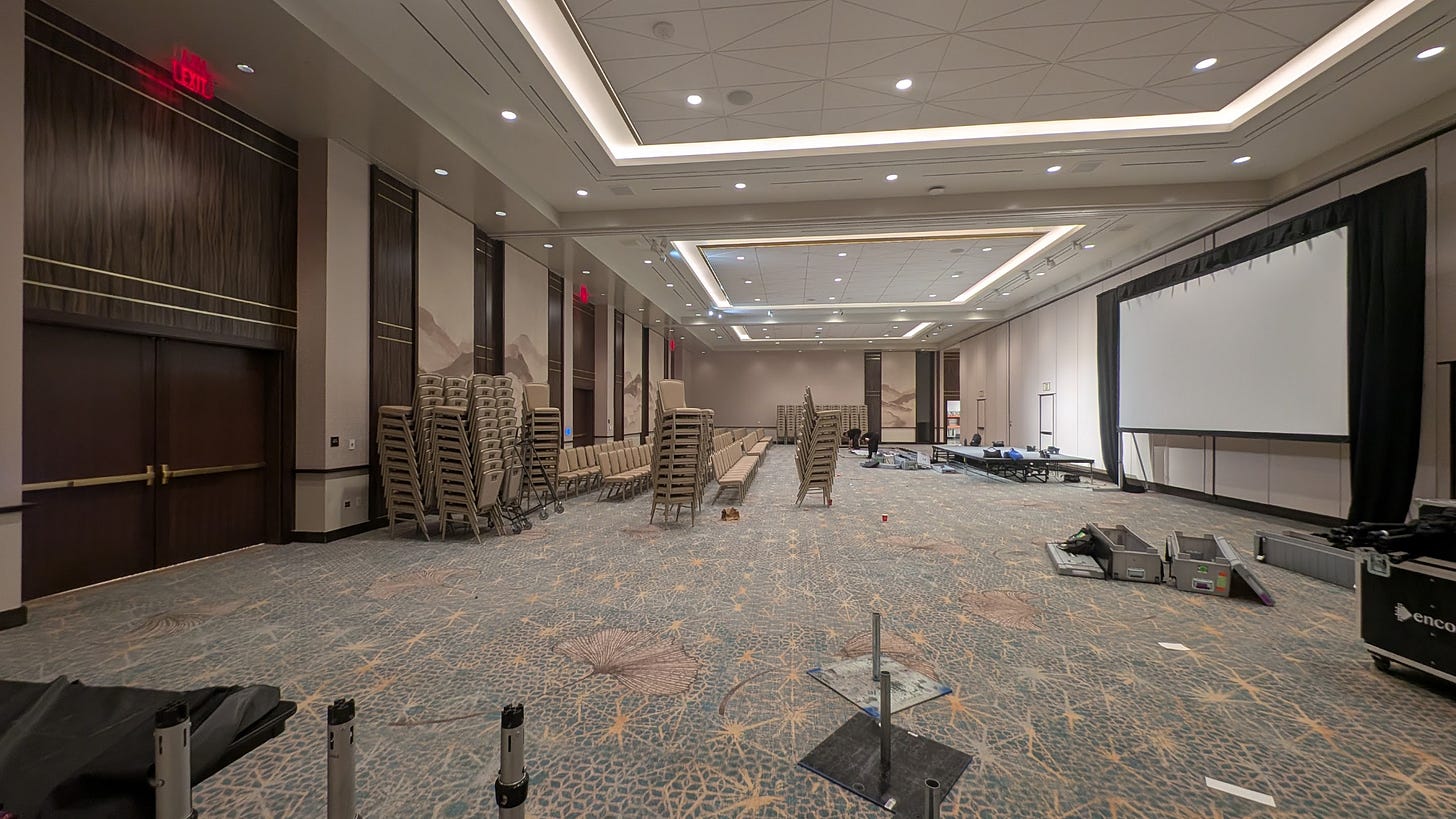In the air
Now what?
This year, there were no venture capitalists.
Often, at tech conferences, there are. They typically drift around as an odd sort of anti-matter, existing among everyone else, but in a different dimension. They are neither practitioners nor prospects, neither speakers nor sponsors. They don’t teach technical workshops, and they definitely don’t attend technical workshops.1 For most of us, conferences are a place to sell or be sold to, to learn “best practices,” to mischievously order the Macallan 12 at sponsored happy hours, and to gossip. But VCs are there for other reasons, as rogue agents with agendas all their own—to evaluate and to “diligence,” to flatter and to politic, and to astroturf a brand as “one of us.”
People complain about this sometimes. If you are a startup, you can’t relax around a VC—is this conversation a pitch? Could they do our next round? Are they thinking about doing our competitor’s next round?—and you definitely can’t sell to a VC. Too many venture capitalists, people whisper, are bad for the vibes.
But they’re also important representatives of a different vibe: Potential. VCs are moths to a flame: They swarm towards the action; the energy; the chaos; the delirium. They are drawn to the transitional epochs, the moments when the world reinvents itself—when it has let go of one trapeze but not found the next, suspended in the air, with nothing certain to hold on to. They are there, in the beginning.
For years, Coalesce, dbt Labs’ annual conference and the closest thing to a center that Silicon Valley’s data ecosystem has, has been that sort of flame. Its hosts were the ringleaders of a booming new circus, and its attendees were starting companies, challenging boundaries, and inventing things. They were, in a niche and indirect way, changing the world.2 People talked about the future a lot at Coalesce, and every conversation had an unspoken preamble: That we were the ones creating it. Imagine a world of consistent metrics; imagine a world where we can do math on text; imagine a world where we all share a single corporate brain; imagine a world without bugs. We were a major prong that was pushing on the edge of what was possible, and VCs wanted a piece of the heat.
But the weather in Las Vegas was cooler this year. The usual scorching temperatures from data conferences past were gone. There were more pronunciations about ends than beginnings.
Eulogies feel too blunt—there are still things to do and to talk about, like the unappreciated lessons behind dbt Labs’ success, or what might happen after this week’s merger, or how everything could contort itself again. But these questions have become more insular. They are a community’s local curiosities. They are interesting to us, now, but they are, apparently, no longer interesting to venture capitalists.
Las Vegas, so nice we did it twice.
Or thrice. Or a half dozen times, if you’ve been involved in this industry for the last few years. And when you come to Vegas enough, you begin retracing your steps. You remember standing at this bar; pacing that promenade; sitting on the floor in that corner. You notice when they update the carpet in the vendor hall. You’re pretty sure that’s the same bar where they had the happy hour last year. That’s the table where Wes hit a hard eight. That’s the back hallway in the airport where you negotiated the last terms of the deal; that’s the Starbucks that you went to celebrate signing the last Docusign.
People say that living in college towns can feel like living life on repeat. The same is true of conferences here. New people show up; mainstays leave; deja vu; ghosts haunt you in the hallways. Is he here this year? I didn’t expect her to be back. Did we meet last year? Did we meet at this bar? It all becomes static—constant motion with no movement.
But that is the point, right? After all, why do we work for startups? Why do we start companies? Why are we drawn to rocket ships?
The romantic answer is that we do it for the ride. It is to go fast. To go cruising, to entertain ourselves; to speed so fast, we feel we were drunk. It’s to live in the center of the universe, where the plasma is still hot, and where there is more potential than permanence.
The other answer is we want to ride the rocket ship to a particular destination—to find work and get promoted; to buy a bigger house and live in the suburbs. To buy business class tickets, to escape the turbulence, and to reach a smooth cruising altitude. In other words, permanence is the point: Make a thing, sell a thing, and disappear into the mountains. Or, less dramatically, get a job as a Senior Vice President of Enterprise Data Platforms, E-Commerce Cloud.
That’s the catch-22 of Silicon Valley, and of the thrill of potential: You can only keep it so long as you don’t realize it. With a few rare exceptions, you can be comfortably rich or you can be culturally relevant. You can work on critical global plumbing, or you can be inventing new toys. You can matter to the frenetic zeitgeist of Hacker News, or you can grow up.
On the south end of the Las Vegas strip, very rich men in blue shirts and plaid blazers were giving keynotes about how Oracle Applications are “transforming workflows and business processes to speed your success.” I spotted a couple of their attendees who had wandered north near us, walking through the casino floor with branded backpacks and blaring lanyards. They were out of place, talking in corporate acronyms I didn’t understand, and, by all appearances, having a rather good time.
That is the question now, I suppose. Oracle is among the most successful companies in the world, and the people in its orbit are among the tech industry’s most quietly important operators. If all goes well—historically well—in our world, we can become them. Coalesce is potential, realizing itself. They are potential, fully realized.
Is that what we want? Is that who we want to be? Is that the ambition?
The collective effort of a generous community has granted us a great privilege: We can stay here forever. This industry will exist3 longer than we will; our career ladders extend higher than most of us can climb.4 We have more data, more problems, and more to do. We can get away with hosting conferences that are more high-wire demos than scripted “fireside chats” from high-paying customers. We can keep building the invisible infrastructure of modern society, and log off when the sun sets and it’s time to go home.
But if we want to live in the spotlight—on the wild edge of possibility, with the frontiersmen—that is no longer here. That is elsewhere, at different companies, in different conference halls, with different people. We are the settlers now; the townspeople; the ones with the family and kids. We can write the case studies about history, but not the dispatches from the front. Those, we will be told about, after they happen.
When I boarded my flight out of Vegas last night, the man sitting by the window had already taken residence in his seat. He was wearing AirPods, Lululemon joggers, and Nike Flyknits. His window shade was closed. Throughout our taxi, our takeoff directly over the Las Vegas strip, our tear across the American West and into a Pennsylvania sunrise, and our slip into the dawn over Manhattan, his window shade remained closed.
I spent the entire flight mad, bitter about the adventure on the other side of the shade that I was missing. He spent the entire flight sleeping peacefully.
There is one other thing: When I first found dbt, I was a pessimist. We had built our own transformation tool called easybake, and liked my version better than theirs. I thought their ref functions were overly complicated; I didn’t have the emotional octave for their community Slack.
As I was slowly proved wrong, we all found our roles over the years—the quiet builders, the cheerleaders, the genuine enthusiasts, the opportunistic bandwagoners. The organizers and the leaders. The optimists; the critics, the skeptics, the haters.
Once you see these personas and see who occupies each character, you could not help but notice something else this week: In the end, it was the optimists who were on stage. It is not those who wondered about how it might fail, but those who believed the crazy stunts might just work. They are the ones who survive, because when everyone stands up to do the wave, you can only scowl at it for so long.
No matter. It is never too late. All life is is whatever’s ahead, and we are supposed to sing or to dance while the music is being played, be it in this neighborhood that once was, or in the next neighborhood that is just becoming.
Yes, I understand that you attend the technical workshops. You still read ArXiv; you aren’t like the other VCs; you are an operator—no, a builder—at heart. I’m talking about everyone else.
Did git change the world?
Ten percent of you are probably insulted by the question. Of course git changed the world. You have always thought this; you have evangelized this; you are mad that nobody else appreciates this. git made collaborative software development possible. It made large-scale open source projects possible, and the world is run on large scale open-source projects. It is the printing press of the computing age. To imagine a world without git is to imagine a world where every building is built by one person.
Another forty percent of you are probably thinking, “huh, ok, maybe git did change the world.” You’ve always thought of git as a useful nuisance, a series of incantations that, when recited correctly, do the same thing as uploading a file to Dropbox, and when recited incorrectly, require you to throw away your work, throw away your computer, throw away your career, move to Montana, become a ranch hand, eat only the potatoes you grow and the cattle you raise, and to only think about upstream conflicts when you stare, through squinted eyes across a sun-scorched creek bed, at two fighting coyotes.
And fifty percent of you are probably asking, what is git? (For those of you who are asking this, it is a very rigorous and pedantic way to track changes in text files. But rather than just telling you when things change, it instead creates branching tributaries of divergent timelines, which inevitably intersect in paradoxical ways, and eventually implode.)
In any case, there is certainly a case to be made for the first argument. If nothing else, git completely changed the economic structure of software development. It makes updating software less brittle and more reliable, and it makes it easier for engineers to work together. Engineers are more productive, and the software we all use is better, because of git. Many hands make light work, and git made it possible to build software with many hands.
It is conceivable that you could make a similar argument about dbt, which has changed how data teams work together. If data is important—which, you know—then perhaps all of this did change the world.
I mean, there is a half-written draft in my notes somewhere called “How data fails.” But I have a pretty bad track record on this stuff.


This made my day:
"...move to Montana, become a ranch hand, eat only the potatoes you grow and the cattle you raise, and to only think about upstream conflicts when you stare, through squinted eyes across a sun-scorched creek bed, at two fighting coyotes."
would love your thoughts on some of my stuff. follow me back, I could DM you?